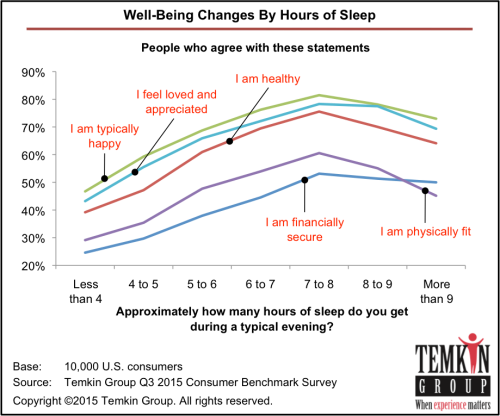Want to Improve Well-Being? Sleep for 7 to 8 Hours
August 17, 2015 1 Comment
One of the themes from the positive psychology movement is the importance of sleep. Research has shown that happiness is very reliant on people getting enough sleep. Check out Ariana Huffington’s excellent Ted Talk where she identifies sleep as a critical ingredient to success.
We decided to test that theory in our most recent study of 10,000 U.S. consumers. We examined the degree to which consumers agree with a series of statements about their well-being, and then compared responses from people based on the typical amount of sleep they get. As you can see below, people who get 7 to 8 hours of sleep per night are the most well off.
People who get 7 to 8 hours of sleep per night are the most likely to feel as if they are:
- Happy
- Loved and appreciated
- Healthy
- Financially secure
- Physically fit
The bottom line: There’s almost nothing more precious than 7 to 8 hours of sleep.

It’s great to see this here, Bruce! There are three pillars to long-term health: diet, exercise+play, and SLEEP. Sadly, we don’t hear much about the importance of sleep. The impact that lack of sleep has on cognitive function is something most people are aware of; it’s one of the easiest effects to notice and recognize. But not everyone knows of the physical impact—that not getting enough sleep increases cortisol (the stress hormone) levels and results in a higher average resting heart rate, two factors that work against us long-term.
Certain demographic groups have developed a shame culture around getting “too much” sleep as being a sign of not working hard enough. Brené Brown talks about this using attorneys as an example in The Power of Vulnerability, and there were some great blog posts and articles last year on lack of sleep as a status symbol in start-ups.
Jawbone has been publishing interesting articles with fascinating facts about how we sleep from their accumulated fitness tracker data. Here’s a good one: https://jawbone.com/blog/circadian-rhythm/